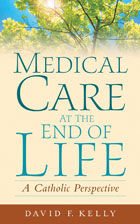Medical Care at the End of Life: A Catholic Perspective
- Profiles in Catholicism
- May 26, 2018
- 3 min read

Prof. David F. Kelly’s book is an attempt to summarize the Catholic Church’s position concerning the complexity of end-of-life issues, most especially in the light of two significant developments on the topic: the papal allocution of Pope John Paul II on March 20, 2004 to the participants in the International Congress on "Life-Sustaining Treatments and Vegetative State: Scientific Advances and Ethical Dilemmas”, and the State of Florida case of Terri Schiavo in 2005. He notes that it “is a practical guidebook that describes in detail the American ehics and law about forgoing treatment. It draws on Roman Catholic medical ethics, since much of what has become American policy in the area was taken from Catholic sources, and it engages certain questions that are currently debated within Catholic medical ethics. But it is not intended only or even primarily for those interested in Catholic issues. It is a book about the ethics of end-of—life care in America.” (Introduction)
Prof. Kelly begins by again first reiterating what he calls the “American consensus” regarding the forgoing of treatment, what he calls ‘the three pillars or bases’ as seen through the American legal practice.
The first pillar is “the recognition that not all treatments that prolong biological life are beneficial to the patient”, that is, the distinction between ordinary and extraordinary means of preserving life.
The second pillar is “the agreement that there is a moral difference – and ought to be a legal difference – between killing people (active euthanasia) and allowing to die.”
The third pillar is “the legal concept of the right to autonomy, privacy and liberty” which American law has enshrouded and developed the first two pillars in practice of determining the morality and legality of end-of-life treatments. He specifically cites twenty-six legal cases to help demonstrate the evolution and development of American jurisprudence in the matter, to 2005.
It should be noted that the book itself is a free-standing development of Part III of Prof. Kelly’s book Contemporary Catholic Health Care Ethics, Georgetown University Press, 2004, in which he applies what he calls his methodology “intrinsic consequentialism,” to address contemporary bioethics. Rev. Nicanor Pier Giorgio Austriaco, O.P., PH.D., reviewed the book on behalf of the National Catholic Bioethics Center Quarterly (Summer 2005) wherein he notes significant reservations:
“Despite his protestations, the form of Kelly’s argument is simple and straightforward utilitarianism. By the same reasoning, it would seem that he would have no principled objection to allowing a dying patient, or her proxy, to consent to an operation in which a doctor dismembers the patient, and thus kills her, to harvest essential organs that could save the lives of her children. Here, the human person is still “adequately considered,” is she not? This is especially chilling, since Kelly later admits that he believes that there may be circumstances when euthanasia and assisted suicide are morally right. He writes, “I continue to disagree with the judgment that active euthanasia and suicide are absolutely morally wrong,” although he allows that “I now consider the dangers greater than I once did” (204). (Austriaco, NCBC Quarterly, p. 426)
Kelly reiterates this position in his current book when he writes:
“It is true that in the United States pain relief is not always properly provided, but the answer in such cases is to insist on getting it, or to fire the doctor, or to change hospitals. There may be other exceptions in addition to the absence of pain relief, though I do not think they are many or common. So I continue to disagree with the judgment that active euthanasia and suicide are morally wrong. But the exceptions are rarer than I used to think they were, and I now, more than I once did, consider the dangers greater.” (p. 131)
Professor Kelly has provided significant research and abundant explanations of terms and concepts, along with an exhaustive (to 2005) list of legal cases which have developed end-of-life ethical thinking and treatment in the civil courts. However, he relies on development through the civil law and while his book is a thorough and useful review of the inevitable struggle to interpret and implement the Church’s magisterial teachings concerning the natural and Divine Law, the basis of development for Kelly is the civil law. Other authors and books contemporaneous to this title have already been updated to 2016, and which have as their foundation and anchor point, the Church’s authentic teachings on life and ethical issues. This book has the depth of exploration and investigation which may be helpful in navigating the terminology and concepts of the end-of-life debates. However, the reservations of more learned scholars about the possible misinterpretations by way of contemporary legal battles make it more of an informative and exploratory speculative resource on the topic, as opposed to a compendium of end-of-life ethical statement, and guide for perplexed Catholics.
